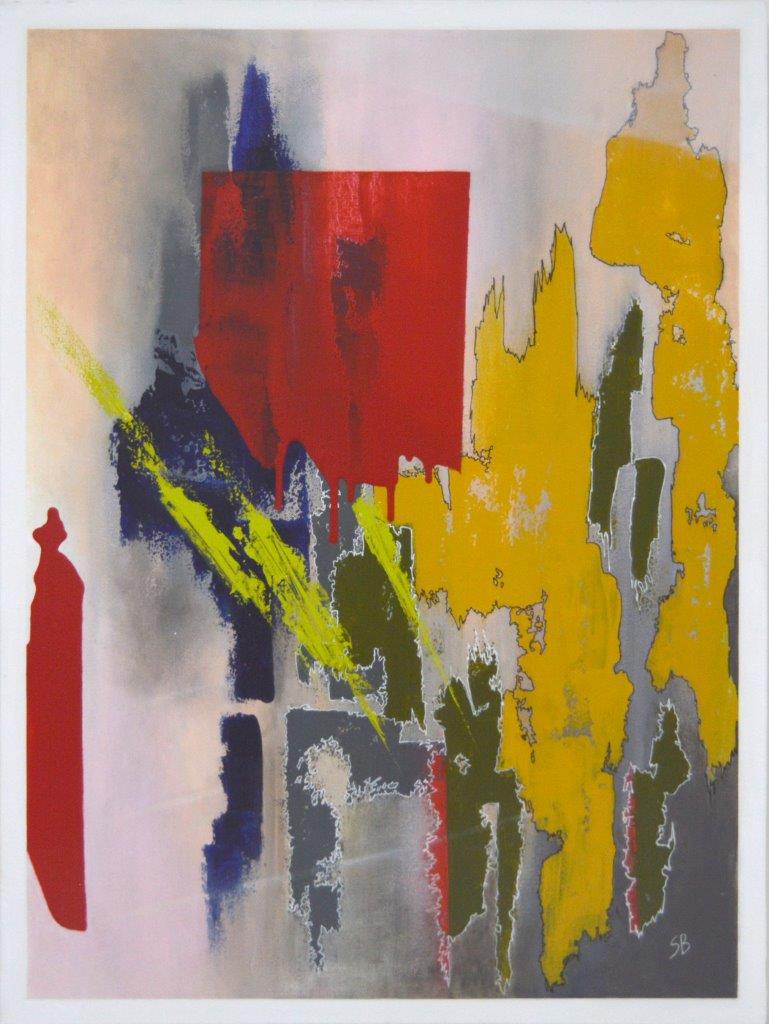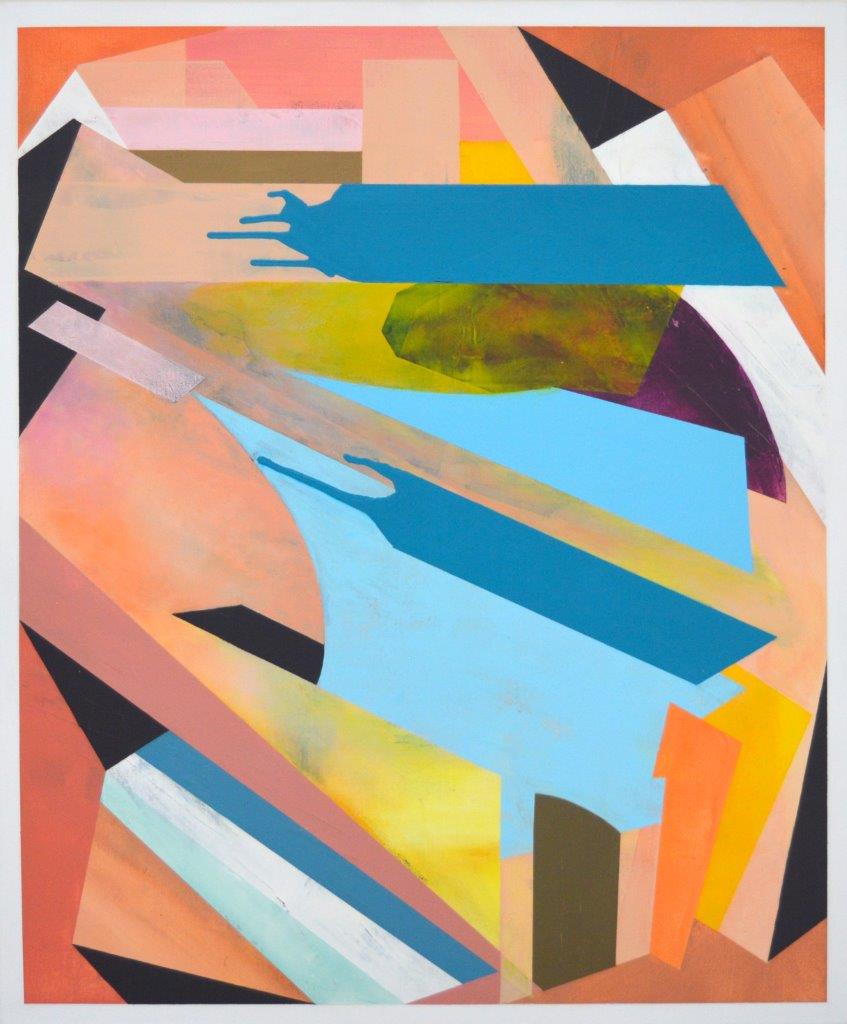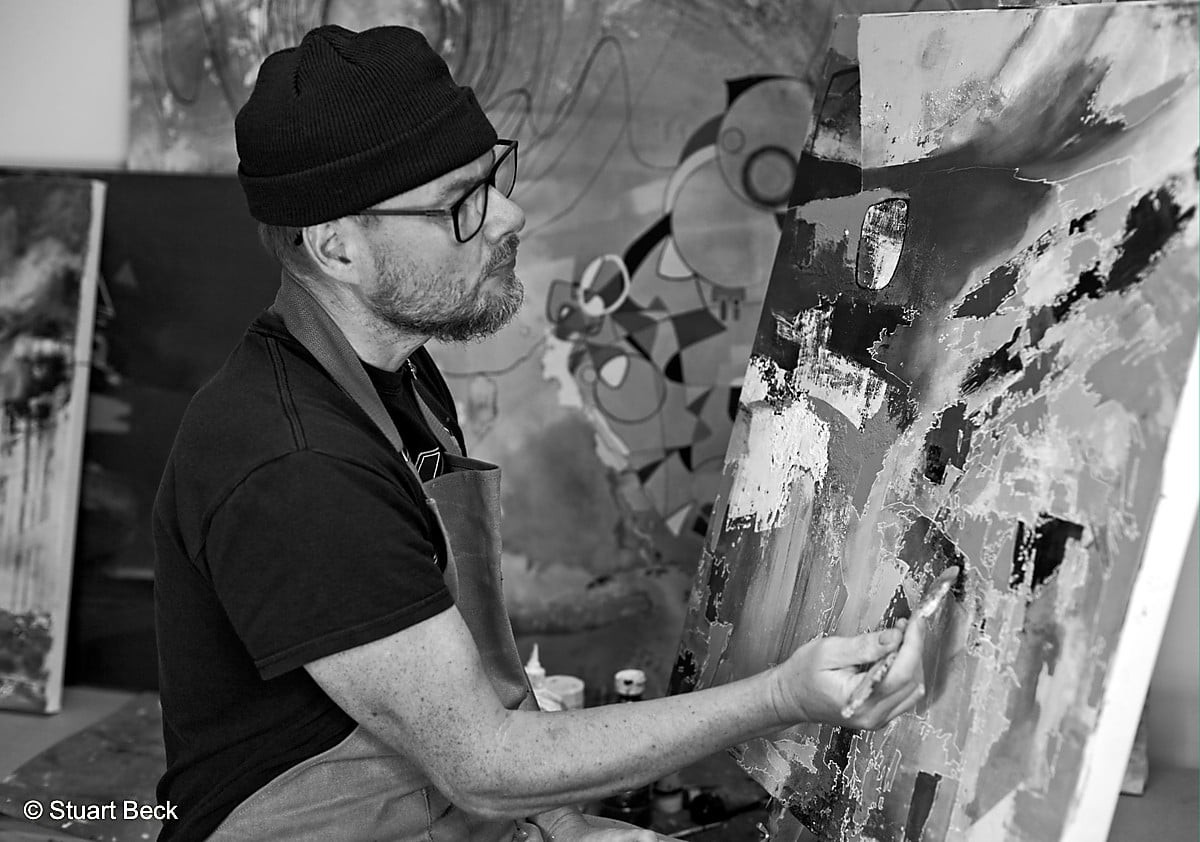- Structure and shape can be the building blocks of any great work of art, however the composition does not always have to be representational. :
Our Head of Art Luke Baker recently sat down with Little Van Gogh artist Stuart Beck to discuss his artistic process and the benefits of stretching your creativity.
Where do you find inspiration?
I am very lucky when it comes to finding inspiration to paint. I can randomly find ideas, such as seeing some moss like vegetation growing on a headstone in a graveyard. I’ll take a photo and at some point in the future an idea from that image will work its way onto the canvas. Another example is just about seeing colours working really well together, either in nature or man-made environments. I am a keen photographer and it is from that specific mind set of viewing everything in search of inspiration that also applies to my painting. There is a little bit of obsessive and compulsive thinking in the mix for me, which I believe to be one of the many quirks of nature that can contribute to a person’s individuality and are the mental and physical nuances that can guide us to activities we feel better suited towards.
As for inspiration to physically start a painting, STARTING is the key! Thinking too hard in the beginning can just lead to nothing happening. I simply take a few moments to think about textures, colours and rough ideas for the sort of style I’m in the mood for. It could be minimalist, using shapes and angles or very texture driven. I choose a blank colour and cover the canvas completely, then make some early marks using a palette knife or brush and that’s it, game on! Once there is some colour and paint on the canvas, I feel inspired to create something that in my mind will be my best painting yet. From here on in it is about slowly building up the picture. A bit like a jigsaw puzzle, but you don’t have the finished picture in front of you. You plot your own way to the finish line by reacting to the previous action.
At some stage in the process I’ll have to change something I quite like. This is the really important phase whereby you break it in order to stretch your creativity. This means I spend a good deal of time staring at the painting in contemplation. I tend to be frustrated in this phase, which I think for some people, it can knock their confidence a bit. I have learnt to embrace this element as a positive side of being creative. It is a good time to re-evaluate yourself and your art and a reminder that without some struggle, there is little reward. Yes, it is a metaphor for life and it applies to making paintings too. I am convinced that this important stage is a requirement to reach a satisfactory conclusion. In times of its absence, I usually find myself revisiting the same painting later on, but just keeping the good parts to inspire something new.
How has your practice changed over time?
I started out in the local Visual Arts Society. That got me some exposure to a local gallery that led to a solo show. I was fortunate to start selling my work early on and even taking on a few commissions. I had a really good start, which then evolved to me working more on a commission basis. I have taken on the view that a commissioned piece of work can be described as a collaboration. Talking to a client about their ideas for a painting ultimately influences my decisions for what I am going to create, therefore adding to my inspiration and creating pieces of art that have much more personal meaning to the buyer.
My paintings change over time, though built on a set of techniques that are recognisable in all my work. You can see the different feel that my paintings have over time, as they are a continual part of my development cycle. I enjoy trying new ideas and gaining a sense of progression with each piece of work.

‘Adrift’

‘Which Direction’
Who are your biggest artistic influences?
I see a great deal of art because it is so easily accessible. I find influences in so many other artists work. It doesn’t really concern me who the artist is, I’m interested in what impact the work has on me. I can be influenced by a piece of work that isn’t to my taste, but appreciate the colour combinations or use of texture for example. I have also visited quite a few places in the world and spent quite a bit of time in the mountains and countryside and find these are engrained influences in my own paintings.
The danger for an artist is to ensure your work is your own. It isn’t possible to not be influenced by others at some level, but you do have to remain faithful to your own ideas.
What’s the purpose or goal of your work?
Selling my artwork did not come about until late on in my life. A break in my career gave rare chance to reconsider what I may actually want to do in my working life. After some consideration I found that the creative process was the one thing I truly enjoyed. My purpose from then on has been to make selling my art my career. Where I would have once taken retirement from the beginning of my working life at the age of seventeen, I now have no desire to retire at all and will hopefully be painting to the very end.
My aim is to simply reach a level where my art provides a regular liveable salary. The purpose of my work is for other people to purchase it because it is something they truly enjoy and want to own. That provides me with an enormous sense of reward and satisfaction and a good helping of gratitude. I can’t describe just how uplifting it is.
Does creating art help you in any other areas of your life?
Creating art is definitely something that is part of me, not just an activity I enjoy. It helps me because it is something I feel the need to do and is incredibly rewarding. Making a living from my art is the icing on the cake because my time painting is essential to my wellbeing and avoids time spent in other money making activities. Art also introduces me to new and frequently enthusiastic art lovers and other like-minded artists. Ultimately, it is finding your place in the world to belong and be happy.
What’s the best piece of advice you have ever been given?
My Mum always used to say ‘I don’t worry what you choose to do in life, just do what you think is the right thing and don’t be swayed by those that think otherwise’.
She was a wise woman.


YOUR COMMENT